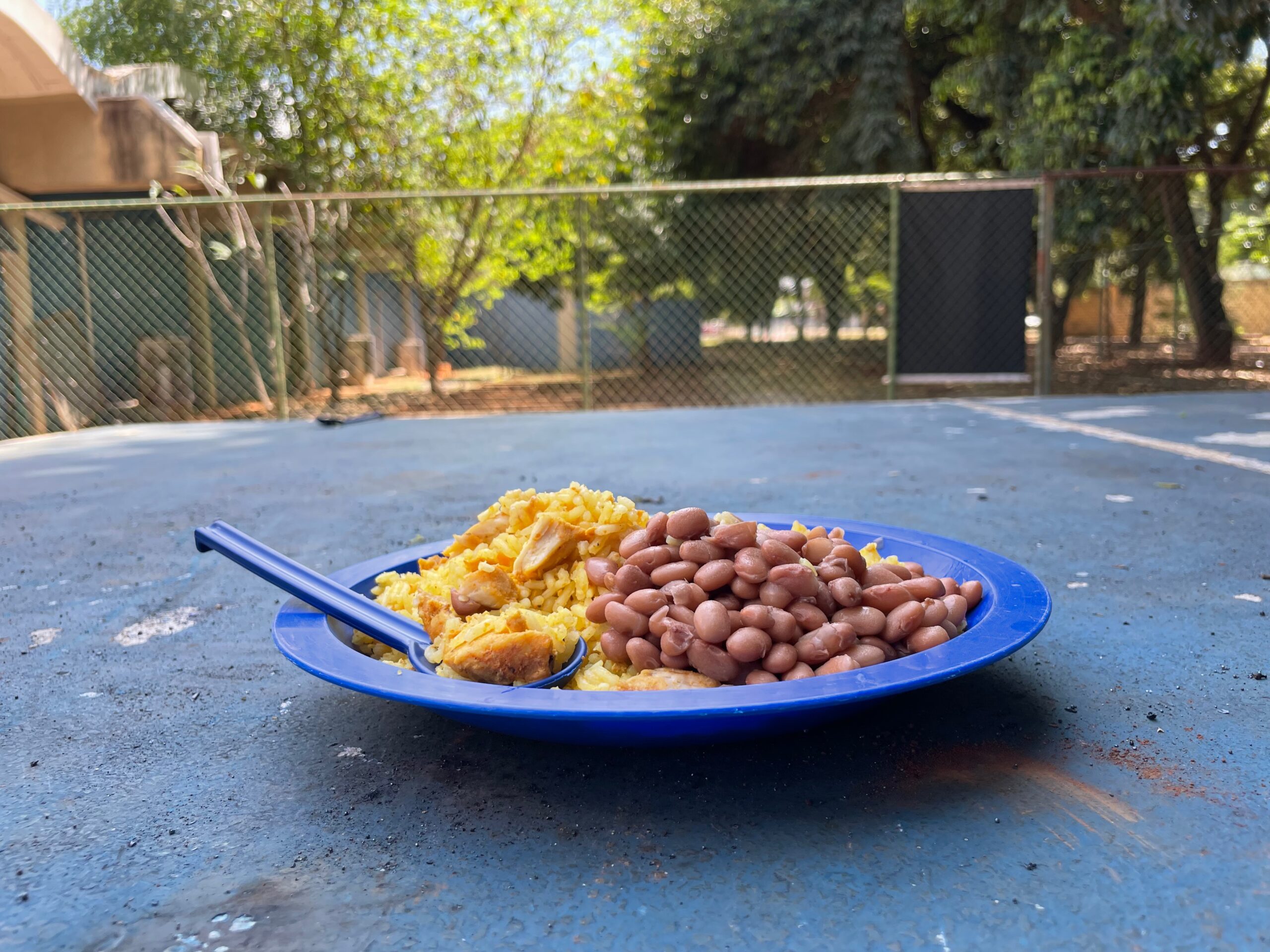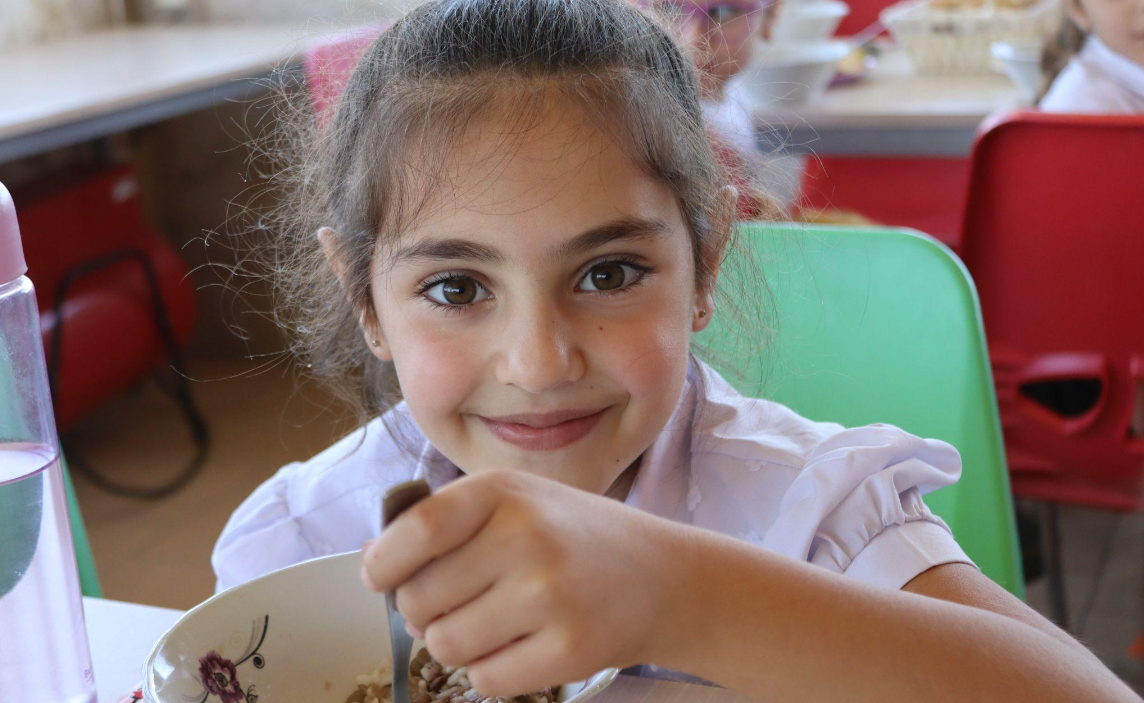
On Tuesday, January 30, representatives of the Armenian government and members of the World Food Programme (WFP) in the country took part in the first session of the “Virtual Study Visit: Brazil” with the Brazilian government and organized by the WFP Centre of Excellence against Hunger Brazil, in partnership with the Brazilian Cooperation Agency (ABC, in Portuguese), of the Ministry of Foreign Affairs, and the National Fund for Education Development (FNDE, in Portuguese). The workshop is part of a 12-year partnership between the Brazilian government and the Centre of Excellence.
During the meeting, Karine Santos, General Coordinator of the National School Feeding Programme (PNAE, in Portuguese) of the National Education Development Fund (FNDE), presented the main points of the PNAE, which led Brazil to become co-president of the Global School Meals Coalition along with France and Finland.
The PNAE currently serves the entire Brazilian territory, reaching around 40 million students with school meals in more than 150,000 schools. One of the programme’s main aims is to provide quality, nutritionally adequate and healthy meals on a regular basis. It also has other components of interest to partner countries, such as the purchase from family farming and the diversity of menus.
“The Brazilian government firmly believes that investing in food security and nutrition for the younger generations is an investment in development and in equality and in guaranteeing the human rights of society as a whole. School feeding programmes can and should be used as strategies to advance several Sustainable Development Goals (SDGs) in our countries,” said Anderson Wilson Sampaio Santos, Director of Educational Activitiesons at FNDE.
During the meeting, Paola Barbieri, project analyst for Trilateral South-South Cooperation with international organizations at the Brazilian Cooperation Agency (ABC), of the Ministry of Foreign Affairs, mentioned the Brazilian government’s willingness to cooperate with partner countries. Fabio Vaz Pitaluga, Brazil’s ambassador to Armenia, highlighted the potential of bilateral cooperation and referred to the close historical ties between the two countries and the importance of the Armenian diaspora in Brazil, putting the embassy at the disposal of new contacts and structuring actions in the field of school feeding and food and nutrition security.
In Armenia, the national school feeding programme is implemented by the Armenian government, in partnership with the Russian Federation and the WFP. According to Araksia Svajyan, Armenia’s Deputy Minister of Education, Science, Culture and Sports, around 100,000 children are fed a daily hot meal in schools in 10 regions of the country. “I think it’s important to emphasize that the programme provides a balanced diet,” she said.
The programme adopts an integrated approach to food security, based on the principles of economic sustainability, community participation and adaptation to climate change. According to Satenik Mkrtchyan, director of School Feeding and Child Welfare at the National Centre for Education Development and Innovation, the programme’s main objectives are to promote quality education, to adapt schools to provide warm and nutritious food for students and to promote community development. It seeks to respect regional specificities, foster the circular economy and promote nutritional education and social responsibility actions, through, for example, the creation of vegetable gardens, information campaigns and training actions.
The country director of WFP Armenia, Nanna Skau, reinforced the idea that school feeding is an investment and not an expense: “I see that both countries can learn from each other, and Brazil’s integrated approach has proven to be effective as a vehicle to develop and involve rural areas and to address issues of social cohesion”. She added that the use of renewable energy sources and activities such as greenhouses and orchards can contribute to ensuring the sustainability of school feeding actions in schools.
About the “Virtual Visit: Brazil”

The Virtual Visit was launched in 2021 by the Centre of Excellence, in partnership with FNDE and the Brazilian Cooperation Agency (ABC, in Portuguese), of the Ministry of Foreign Affairs, and consists of a series of videos that simulate an immersion in the Brazilian National School Feeding Programme (PNAE, in Portuguese), as well as virtual meetings to discuss the programme and its implementation.
Although it is not intended to replace the traditional on-site visit, the “Virtual Study Visit: Brazil” covers the most relevant points of the messages conveyed in a face-to-face visit to Brazil, supporting, in a cost-effective way, the dissemination of the main elements that have contributed to the success of Brazilian policies in this area.
For the Director of the WFP Centre of Excellence, Daniel Balaban, the visit is a way of promoting the exchange of successful experiences in school feeding in a simple and economical way. “The virtual visit avoids, for example, the need to organise an exploratory face-to-face study visit, which can cost more than 20,000 dollars for a delegation of around 6 people. It’s therefore a powerful tool for getting to know each other,” said the Director.
Over the last few years, Namibia, Angola, Ethiopia, Lesotho and Sierra Leone have benefited from the “Virtual Study Visit: Brazil”. In some cases, the good practices and lessons learnt have led to subsequent high-level or technical visits to Brazil. The Brazilian counterparts were also able to learn from the experiences shared by the partner countries.
Representatives of the Armenian government and the WFP in the country will receive videos covering the main elements of the PNAE. The next meeting between the two countries will take place on February 6th, with a session exclusively for questions and answers.




